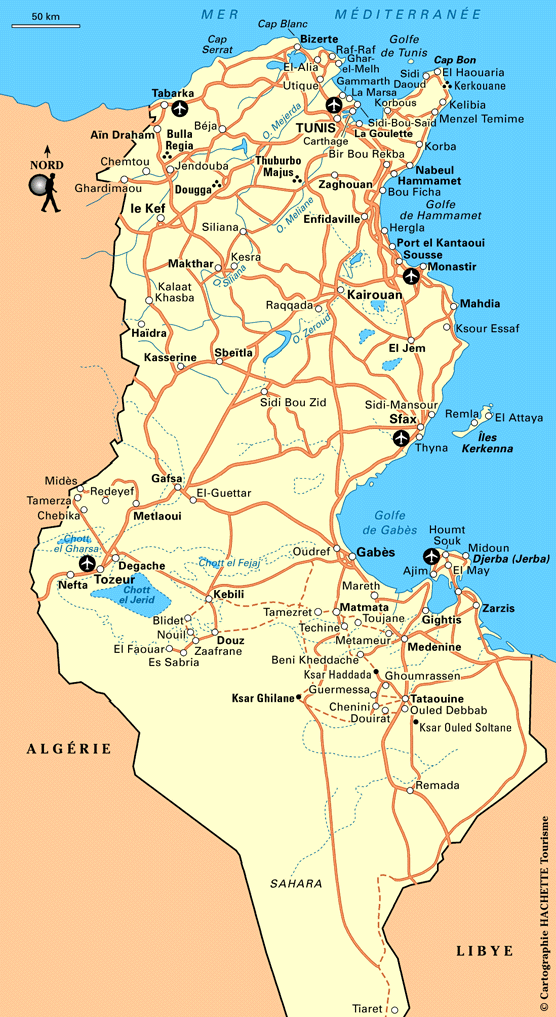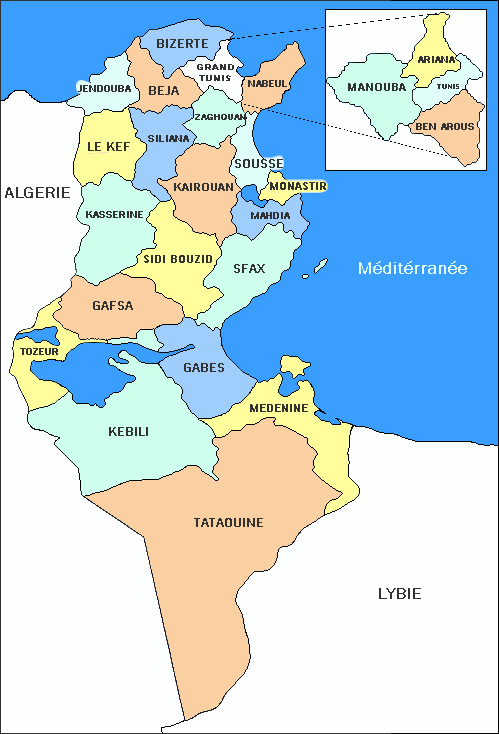Tunisia is the smallest of the nations situated along the Atlas mountain range. The south of the country is composed of the Sahara desert, with much of the remainder consisting of particularly fertile soil and 1,300 kilometres (810 mi) of coastline. Both played a prominent role in ancient times, first with the famous Punic city of Carthage, then as the Roman province of Africa, which was known as the "bread basket" of Rome. Later, Tunisia was occupied by Vandals during the 5th century AD, Byzantines in the 6th century, and Arabs in the 8th century. Under the Ottoman Empire, Tunisia was known as "Regency of Tunis". It passed under French protectorate in 1881. After obtaining independence in 1956 the country took the official name of the "Kingdom of Tunisia" at the end of the reign of Lamine Bey and the Husainid Dynasty. With the proclamation of the Tunisian republic on July 25, 1957, the nationalist leader Habib Bourguiba became its first president.
Tunisia has relations with both the European Union—with whom it has an association agreement—and the Arab world. Tunisia is also a member of the Arab Maghreb Union, the Arab League and the African Union. Tunisia has established close relations with France in particular, through economic cooperation, industrial modernization, and privatisation programs. The government's approach to the Israel-Palestine conflict has also made it an intermediary in Middle Eastern diplomacy.
The word Tunisia is derived from Tunis; a city and capital of modern-day Tunisia. The present form of the name, with its Latinate suffix -ia, evolved from French Tunisie. The French derivative Tunisie was adopted in some European languages with slight modifications, introducing a distinctive name to designate the country. Other languages remained untouched, such as the Russian Туни́с (Tunís) and Spanish Túnez. In this case, the same name is used for both country and city as in تونس and only by context can one tell the difference.
The name Tunis can be attributed to different origins. It can be associated with the Phoenician goddess Tanith (aka Tunit), ancient city of Tynes or to the Berber root ens which means "to lie down".
Farming methods reached the Nile Valley from the Fertile Crescent region about 5000 BC, and spread to the Maghreb by about 4000 BC. Agricultural communities in the humid coastal plains of central Tunisia then were ancestors of today's Berber tribes.
It was believed in ancient times that Africa was originally populated by Gaetulians and Libyans, both were nomadic people. The demigod Hercules died in Spain and his polyglot eastern army was left to settle the land, with some migrating to Africa. Persians went to the West and inter married with the Gaetulians and became the Numidians. The Medes settled and were known as Mauri latter Moors. Sallust's version of African history must be considered with reservations. These stories more likely recall Aryan invasions from Spain.
The Numidians and Moors belonged to the race from which the Berbers are descended. The translated meaning of Numidian is Nomad and indeed the people were semi-nomadic until the reign of Masinissa of the Massyli tribe. At the beginning of recorded history, Tunisia was inhabited by Berber tribes. Its coast was settled by Phoenicians starting as early as the 10th century BC. The city of Carthage was founded in the 9th century BC by Phoenician and Cypriot settlers. Legend says that Dido from Tyre, now in modern day Lebanon founded the city in 814 BC, as retold by the Greek writer Timaeus of Tauromenium. The settlers of Carthage brought their culture and religion from the Phoenicians. After a series of wars with Greek city-states of Sicily in the 5th century BC, Carthage rose to power and eventually became the dominant civilization in the Western Mediterranean. The people of Carthage worshipped a pantheon of Middle Eastern gods including Baal and Tanit. Tanit's symbol, a simple female figure with extended arms and long dress, is a popular icon found in ancient sites. The founders of Carthage also established a Tophet, which was altered in Roman times.
Tunisia has relations with both the European Union—with whom it has an association agreement—and the Arab world. Tunisia is also a member of the Arab Maghreb Union, the Arab League and the African Union. Tunisia has established close relations with France in particular, through economic cooperation, industrial modernization, and privatisation programs. The government's approach to the Israel-Palestine conflict has also made it an intermediary in Middle Eastern diplomacy.
The word Tunisia is derived from Tunis; a city and capital of modern-day Tunisia. The present form of the name, with its Latinate suffix -ia, evolved from French Tunisie. The French derivative Tunisie was adopted in some European languages with slight modifications, introducing a distinctive name to designate the country. Other languages remained untouched, such as the Russian Туни́с (Tunís) and Spanish Túnez. In this case, the same name is used for both country and city as in تونس and only by context can one tell the difference.
 Annonce tunisie : Annonce en |  Annonce tunisie annonces |  Visit www.tunisie-annonce.com |  annonce tunisie |  Tunisie annonce Auto: citroen |
 Annonce en tunisie annonce |  tunisie - Annonces Tunisie |  Tunisie motos |  annonce tunisie |  Carte de la Tunisie |
It was believed in ancient times that Africa was originally populated by Gaetulians and Libyans, both were nomadic people. The demigod Hercules died in Spain and his polyglot eastern army was left to settle the land, with some migrating to Africa. Persians went to the West and inter married with the Gaetulians and became the Numidians. The Medes settled and were known as Mauri latter Moors. Sallust's version of African history must be considered with reservations. These stories more likely recall Aryan invasions from Spain.
 Tunisie Petites Annonces |  annonce tunisie - tunisie |  http://www.tunisie-annonce.com |  annonce tunisie de montre - |  Tunisie Annonces Express |
 Tunisie annonce Auto: Clio |  tunisie-annonce.com hosting provider, historical stats |  Annonces Tunisie - vente |  annonce tunisie |  Annonce Tunisie : Annonces les |
No comments:
Post a Comment